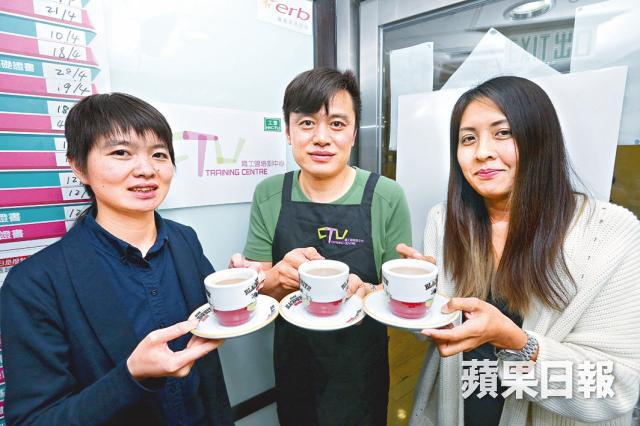Figures from all directions: silent barista pursues dreams by color touch

From left: Hom, Henry and Elsa study silently, hoping to break through the hearing barrier. Photo taken by Li Shuxiong
Behind a cup of coffee, there is a lot of learning. In addition to having a keen sense of smell and taste buds, professional baristas should also know how to listen carefully to the cracking sound of coffee beans during roasting and judge whether milking is complete by sound. Henry, who is hard of hearing, is judged by color and feeling. After taking coffee courses, he is hired by chain stores and becomes a rare "silent barista" in the industry. When he finally finds a job with equal treatment in middle age, Henry is satisfied.
When Henry was a baby, there was only 10% hearing left in both ears due to a high fever. After graduating from Secondary five, he worked a lot of work and worked as a hotel bellboy for five years, but he suffered a lot of grievances, such as listening to his colleagues telling him to carry heavy luggage, but not allowing him to contact the guests, which made him miss the opportunity to get tips, and even tried that the luggage was damaged and misunderstood by the guests. I was speechless and finally chose to leave.
The work experience was not ideal. Henry was so upset that in November last year, he signed up for a coffee maker course sponsored by Longer and co-sponsored by the Confederation of Trade unions. When he attended the class, the aroma of coffee beans filled the classroom. The coffee he made was particularly fragrant, and he gradually became interested in coffee. Coffee making depends not only on a keen sense of smell and taste buds, but also on hearing. If you want to tell whether the roasting is done by the sound of coffee beans exploding, Henry pulls the beans out of the machine and distinguishes them by color. He also listens to the sound of milking, and he relies on the vibration of utensils and observing the foam to tell whether it is finished or not.
Make coffee and get equal treatment.
In February this year, Henry was hired by a chain coffee shop as a dispenser, responsible for mixing frozen drinks, dripping coffee powder and milking. Although he did not have the opportunity to make coffee, he had to make a cup of frozen drink within a minute, which was very satisfying. His colleagues were all hearing people and they were worried that it would be difficult to communicate. Fortunately, the store manager never looked down upon him. He also communicated with his colleagues by writing paper and reading lips. He was treated equally, describing this as the most satisfying and enjoyable job for him. He will go to school to learn to pull flowers, hoping to open a coffee shop where all baristas are baristas by people with hearing impairment.
Elsa and Hom, who are moderately hearing impaired, also study silently and enroll in basic English certificate courses. Elsa, who works as a clerk in a clothing company, said that at 05:00, the transfer from a special school to an ordinary school failed to catch up. After joining the society, my colleagues who were better at English were promoted at the same time, but I stood still, so I signed up for further studies, and now I have a lot of confidence in English. Hom, who also works as a clerk, has also been reprimanded by his boss for his poor English, so he hopes to improve his English.
The CTU training Centre offers a variety of courses for people with disabilities and rehabilitation of work-related injuries. The courses are funded by the employees retraining Board and are free of charge. Some of the courses are entitled to in-school allowance and employment matching. The centre will follow up the employment situation of the trainees for six months.
■ reporter Li Yongxi
Important Notice :
前街咖啡 FrontStreet Coffee has moved to new addredd:
FrontStreet Coffee Address: 315,Donghua East Road,GuangZhou
Tel:020 38364473
- Prev

The breeze blows through the most poetic open-air cafe.
Introduction: for Parisians, the meaning of a cafe is not only a place to kill time, but also a place to spend time. In the cafe, they either muse or talk, let their thoughts wander, in the strong aroma of coffee, in the intense collision of the sparks of thought, the birth of immortal great works, but also witnessed the true appearance of love. The road to the god of flowers is the road to freedom.
- Next

Taiwan drinks 2.85 billion cups of coffee a year to discuss the five conditions for good coffee
In recent years, American coffee is gradually loved by consumers, and consumers pay more attention to the origin and flavor of coffee beans, which also leads to the rapid growth of professional coffee shops. According to the information of the newspaper department, the black gold business opportunity force is rising! How much do Taiwanese love coffee? Figures can talk. Coffee consumption in Asia has risen rapidly in recent years. Taiwan has a coffee business opportunity of 70 billion a year, and the import of coffee beans in 2015 is more than 2011.
Related
- What documents do you need to go through to open a coffee shop? coffee shop coffee shop certificate processing process
- How to purchase Coffee beans in small Cafe how to choose a suitable supplier for domestic Coffee supply Company
- How to drink Starbucks Fragrance White Coffee? how to make Australian White Coffee? what Italian coffee beans are recommended?
- The Story of Flora Coffee: the name of Flora Coffee Bean and the implication of the Flowers on Florna Coffee
- How much does a cup of coffee cost? How much is the profit of a cup of coffee? What is the profit of the coffee shop in a year?
- Yunnan small Coffee, known as "fragrant Coffee", introduces the characteristics of Alpine Arabica Coffee producing areas in Yunnan, China
- 2023 latest Starbucks full menu price list how much is a cup of Starbucks coffee what is better to drink the most popular hot and cold drinks recommended
- Starbucks different kinds of Coffee Price list Starbucks menu 2023 Top Ten Best drinks in Starbucks
- Starbucks Spring praise Comprehensive matching Coffee Bean theme Story Packaging implication and taste description
- The cost of a cup of coffee latte American coffee cost price and selling price

